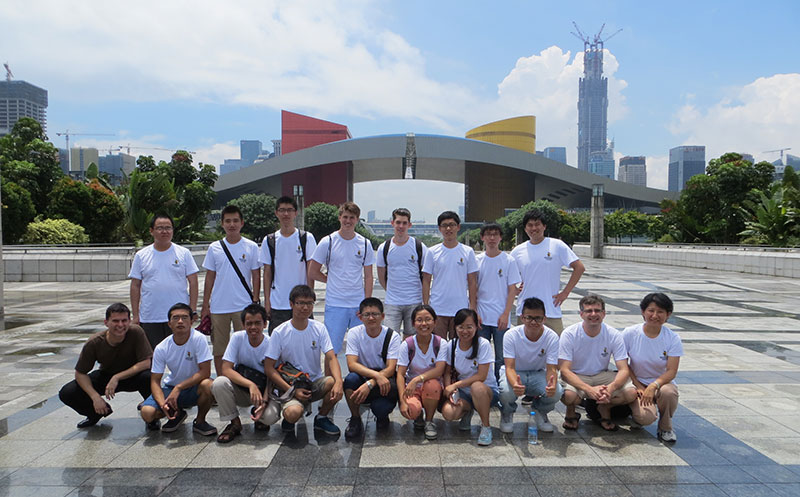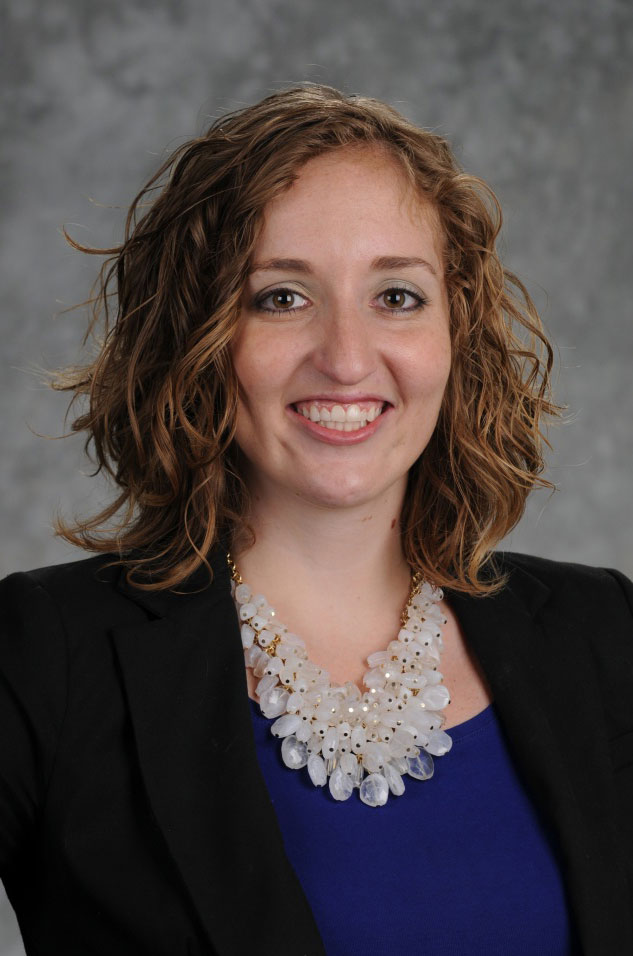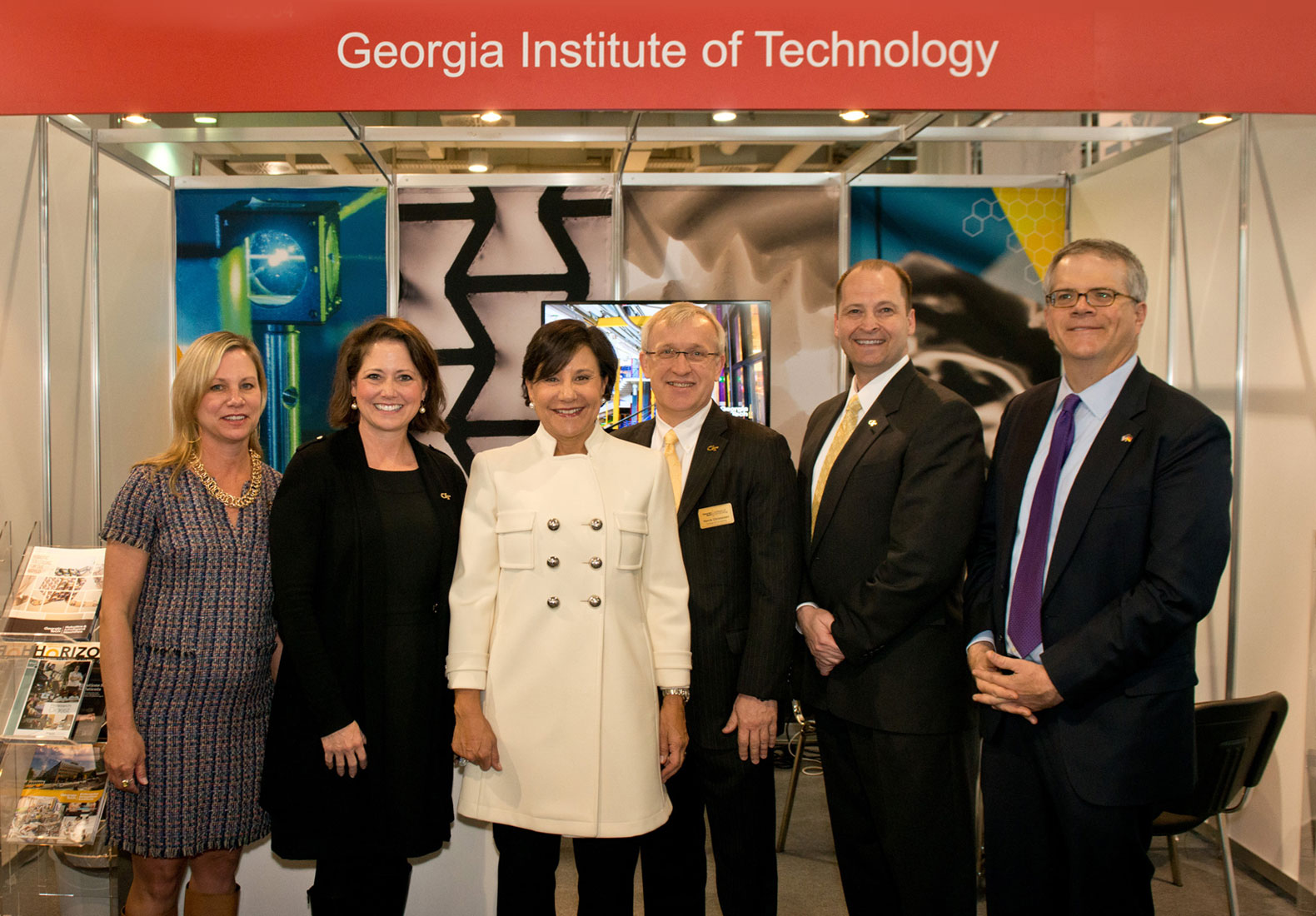
Annual Report Navigation
Engaging with the World
Leadership in global education, research, and industry engagement is a hallmark of the Georgia Tech experience. Our students, faculty, and staff consistently view the work of creating what’s next through an international lens.
Educational Outreach
Shenzhen Program Adds to Global Education Options
A new international initiative, the Georgia Tech-Shenzhen Master of Science in Electrical and Computer Engineering (ECE) degree program, allows students from all over the world to receive a high-quality education from Georgia Tech faculty, gain experiences studying and living in China, and interact with multinational companies in China.

Students pursuing a Master of Science in Electrical and Computer Engineering at Georgia Tech-Shenzhen gain valuable experiences studying and living in China, and interact with multinational companies.
The master’s degree offered in Shenzhen is identical to its counterpart at the Atlanta campus. Georgia Tech-Shenzhen is located inside the Shenzhen High Tech Industry Park, in close proximity to hundreds of high-tech companies, making it easy for students to gain internship experiences.
“An investment in cooperative education programs between the U.S. and China is an investment that pays dividends for all of us,” said Consul General Jennifer Galt of the U.S. Consulate General in Guangzhou, China. “These programs bridge language barriers, open lines of communication, and connect people in both immediate and lasting ways. Georgia Tech’s program in Shenzhen is thus another terrific step forward in continuing to build relations between the United States and China.”
“We thank Tianjin University for helping Georgia Tech launch this new initiative in Shenzhen,” said G. Tong Zhou, ECE professor and director of the Georgia Tech-Shenzhen program. “Having had bilateral summer programs with Georgia Tech since 2009, Tianjin University has been a generous supporter of Georgia Tech’s efforts in China and is an important partner.”
Tech Partners With edX to Offer Online Courses
Georgia Tech signed an agreement with edX, the nonprofit online learning destination, to offer Massive Open Online Courses (MOOCs) for learners around the world.
The first Georgia Tech class offered was Information and Communication Technology Accessibility, which addressed the importance of developing an inclusive workplace for employees and customers with disabilities.
“Higher education must prepare the learner not just for their first job after graduation, but also for their third or fourth.”
Rafael L. Bras
Offering courses under the brand GTx, Georgia Tech joins a consortium of edX partners that has instructed more than 6 million learners since its inception. Additional Tech courses were slated to be announced by year’s end. GTx will also explore credit programs on edX and innovative ways of making traditional Tech programs available to more learners.
“The student and classroom of the 21st century continue to evolve,” said Provost Rafael L. Bras. “Higher education must prepare the learner not just for their first job after graduation, but also for their third or fourth. Our partnership with edX will allow Georgia Tech to reach traditional learners, as well as early- and mid-career professionals, in new and novel ways, creating lifelong learning opportunities befitting a successful and fulfilling career.”
The Institute offered its first MOOC in 2012. Since then, more than 1 million students have enrolled in online courses.
Globally Oriented Research
Helping Cuba Access the World

Michaelanne Dye
A new Georgia Tech initiative called “Cuba Intercambio” is designed to help Cubans more freely access the internet.
As diplomatic relations improve between the United States and Cuba, researchers in the field of human-computer interaction are taking a hard look at the impact of internet access on the island nation, where information has been tightly controlled for more than 50 years. Understanding internet access in Cuba now is useful to researchers and corporations that may seek to engage more directly with Cuba for business, e-commerce, or tourism.
A study by the School of Interactive Computing revealed that censorship, high cost, and severely slow bandwidth keep Cuba residents from freely sharing information among themselves and with the outside world. “Cuba Intercambio” will provide island residents with an email-based method to submit online queries they cannot perform themselves to a team in Atlanta, which will manually search the internet for Cubans and email back their results.
“Cuba has been called the second most isolated place in the world,” said lead researcher Michaelanne Dye, a Spanish speaker and second-generation American of Cuban descent. “Will Cuba at this historical moment be redefined by the internet in any meaningful sense, and what can we learn about their development that might help other low-access areas of the world?”
Dye’s research partners are School Chair Annie Antón (also of Cuban descent) and Professor Amy Bruckman.
Nuclear Instability is Focus of Nunn School Grant

A grant from the Carnegie Corporation of New York will fund a study on command and control of a nuclear arsenal in a cyber-conflict escalation.
The Carnegie Corporation of New York awarded a grant to the Sam Nunn School of International Affairs in the Ivan Allen College of Liberal Arts to study how breakthrough technologies are increasing nuclear instability worldwide.
The grant focuses on a scenario-based examination of the dynamics of command, control, and coordination of a nuclear arsenal in a cyber-conflict escalation. The principal investigators on the project include Professor Mike Salomone and Assistant Professor Jenna Jordan, who are supported by Ph.D. students Phil Baxter and Tarun Chaudhary.
The project team is exploring the phenomenon of escalation during a national response to a large-scale cyberattack. Cyberspace is a strategic venue with critical national security significance. The interdependence among organizations and command structures within the U.S. civil and military complex is being examined, particularly at the “seams” of the country’s patchwork response. Best practices and lessons learned will be developed from scenario-based exercises applied to international contexts.
Industry Engagement
Tech Participates in Hannover Messe Event
Representatives of Georgia Tech traveled to Hanover, Germany, last spring to participate in Hannover Messe 2016, considered the world’s largest industrial technology event. The Institute was part of the United States Pavilion in the Research and Technology trade fair.
“Georgia Tech is in the fortunate position of being one of a few global institutions continually called upon by universities, companies, and governments from around the world to assist in their efforts to grow science, business, and technology in an increasingly innovation-centric economy,” said President G.P. “Bud” Peterson. “We were proud to join the U.S. Department of Commerce’s SelectUSA initiative at Hannover Messe to highlight the many advantages the United States offers as a location for business and investment.”
Georgia Tech continues to be a leader in establishing global innovation portals and partnerships, research and education hubs, and select branch campuses such as Georgia Tech-Lorraine in Metz, France (which recently celebrated its 25th anniversary). The Institute showcased its global impact at Hannover Messe through the use of distance learning and other technologies that deliver educational and research products to students, researchers, governments, and businesses around the world.

Georgia Tech had a prominent presence at Hannover Messe 2016, the world’s largest industrial technology event. Georgia Tech representatives who joined U.S. Secretary of Commerce Penny Pritzker (third from left) and Deputy Secretary of Commerce Bruce Andrews (far right) at the event in Germany were (from left) Suzy Briggs, director of Business and Research Development at the Strategic Energy Institute; Caroline Wood, director of Corporate Relations in the Office of Development; Henrik Christensen, former director of the Institute for Robotics and Intelligent Machines; and Greg King, associate vice president for Economic Development. The Institute showcased its global impact at the event through the use of distance learning and other technologies that deliver education and research products to students, researchers, governments, and businesses around the globe. (Photo courtesy U.S. Department of Commerce.)
International Tech Companies Join New Research Center
AirWatch, AT&T, and Samsung Electronics constitute the inaugural group of founding members of the new Center for the Development and Application of Internet-of-Things Technologies (CDAIT) at Georgia Tech. The involvement of these companies reflects their continuing commitment to the advancement of the transformational capabilities of the Internet of Things (IoT).
“Internet of Things” refers to the ability for all types of devices to communicate with one another through networks like the internet, radio frequencies, and other forms of transmission. Devices could include the equipment in cars, homes, trucks, cargo, health care, and other everyday objects. This new area of technological innovation is receiving increasing attention around the world because of its potential impact on all sectors of the economy and society.
“Having companies of this stature join Georgia Tech in this effort speaks volumes about what we’re trying to accomplish.”
Andrew Gerber
Together with Georgia Tech and the Georgia Tech Research Institute (GTRI), the founding members will closely monitor and actively participate in the expansion of the rapidly growing IoT industry.
“Having companies of this stature join Georgia Tech in this effort speaks volumes about what we’re trying to accomplish,” said Andrew Gerber, Georgia Tech senior vice president and director of GTRI. “We are proud to be recognized as a trusted collaborator in the Internet-of-Things arena. We are eager to harness the unique expertise of our professors, researchers, and students throughout the Internet-of-Things value chain.”
Housed at GTRI, CDAIT (pronounced sedate) is a global, nonprofit, partner-funded center that fosters interdisciplinary research and education while driving general awareness about the Internet of Things.
What's next? ![]() Strengthening Communities
Strengthening Communities
Annual Report Navigation
(text and background only visible when logged in)
